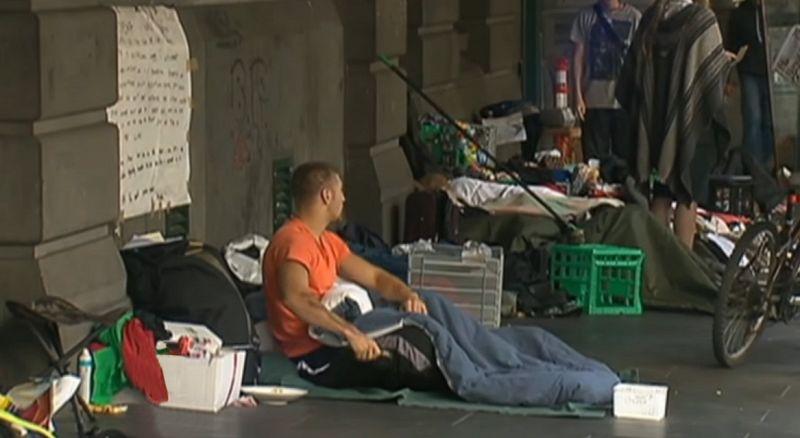An economy that rewards those who profit from material wealth has led to an increase in homelessness, writes Chad Satterlee.
THE LAST AUSTRALIAN CENSUS estimated that around 116,000 people were homeless. Our overall population is now roughly 25 million and our gross domestic product is worth over 1.5 trillion U.S. dollars. Even allowing for a threefold surge in homelessness since 2016, the magnitude of these ratios suggests that homelessness is eminently solvable. Bright children are able to quickly identify solutions. But what if our economic system structurally hinders us from implementing them?
The starting point for this contention is that in Australian society, the choices concerning whether to deploy or withhold most productive assets (including dwellings) and efforts are ultimately made by their private owners. These choices – and in turn how much the economy produces and is capable of producing – crucially depend on how much money can be earned from competing opportunities.
Over one million private dwellings were unoccupied on the last Australian census night. Using water consumption data, the research institute Prosper Australia estimates that 82,000 of these are likely to have been unoccupied for more than 12 months in the city of Melbourne alone. A similar method puts the figure at around 68,000 for the city of Sydney and 300,000 for Australia as a whole.
Imagine a government with a democratic mandate deciding to move homeless citizens into long-term vacant private dwellings.
Here is how one would expect things to play out through the lens of mainstream economics, given the profit constraint:
- property prices would decline;
- the lower rates of return now accruing to property owners would prompt many to divest their assets. The overall quantity and quality of dwellings would fall; and
- some already housed citizens would be tempted to become homeless so as to qualify for cheap housing.
Alternatively, the Government could pay private builders to construct more dwellings out of taxes, move homeless citizens into these properties and hold their rents below market levels. Something like this happens now.
Prediction through the same lens as above: rates of return would fall across the board. Some individuals would partially or entirely withhold their resources and efforts in response and output of services and goods would contract in other parts of the economy.
So, the incentive to make money has generated material conditions which have enabled most Australians to be comfortably housed. We now know very well how to build decent housing for people. But, under assumptions consistent with the overwhelming practice of Australians’ economic activities, this technology can only be used to solve homelessness at the cost of an economy which produces below its potential.
This is a perverse result.
Imagine, in contrast, a system in which all productive assets including land, dwellings and building companies are publicly owned and controlled in some unified manner. Now homeless citizens could be moved into vacant dwellings and building companies could directly construct affordable housing for the homeless without reducing the economy’s productive capacity. Why? Because governments are not generally required to turn a profit.
It doesn’t matter for the present purposes what precise form this alternative takes, or whether realistic decision-making under this system is likely to successfully implement the outlined solutions. The point is that there are motivational tendencies inherent to private property which systemically thwart the ability of our society to end homelessness. Public property need not be so restricted.
Chad Satterlee is an Australia-based political economist.
 This work is licensed under a Creative Commons Attribution-NonCommercial-NoDerivs 3.0 Australia License
This work is licensed under a Creative Commons Attribution-NonCommercial-NoDerivs 3.0 Australia License
Support independent journalism Subscribe to IA.











